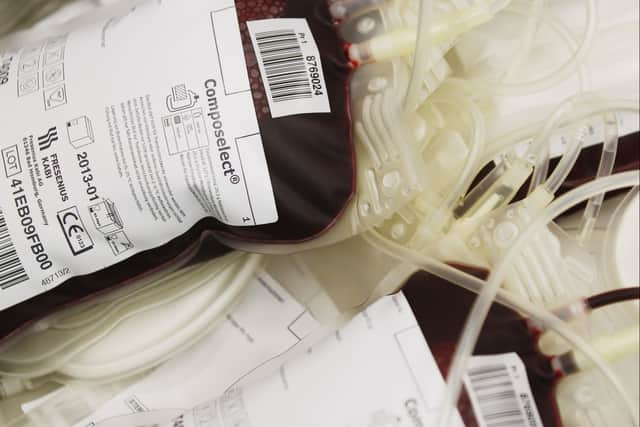Where can I give blood? How to find blood donation centres near you - and who is eligible to donate
and live on Freeview channel 276
Blood shortages in the UK have triggered an “amber alert” meaning hospitals will have to put plans in place to manage stocks. There are growing concerns the knock-on effect will see NHS surgeries postponed or cancelled.
Supplies have been dwindling as donors have not been returning to city blood banks after the Covid-19 pandemic. Hospitals are being asked to “limit their use of blood” and to prioritise patients based on need.
Advertisement
Hide AdAdvertisement
Hide AdNew donors are being urged to come forward, with those in the O blood group in demand as it is the most common blood type and can be received by all patients in an emergency.
So where can you give blood and are you eligible? Here’s everything you need to know.


Where can I give blood?
There are thousands of blood banks where you can donate blood across the UK. To become a blood donor all you have to do is simply register on the NHS Give Blood website, once registered as a donor online and confirmed eligible you will be able to book an appointment at your nearest blood bank.
Regions in the UK also have their own regional blood bank service where you can register and make an appointment. Scotland, Wales and Northern Ireland also may have different regional laws surrounding eligibility so it’s best to double check beforehand.
Advertisement
Hide AdAdvertisement
Hide AdWhy is there a blood shortage?
There is currently a blood shortage in the UK, with the lack of supplies in England leading to an “amber alert”. The NHS normally has six days’ worth of blood, but levels are expected to fall to below two days.
The shortage is thought to be caused by the lack of blood donors visiting cities after the Covid-19 pandemic, with many staff still working from home. Blood banks have also been hit by staff shortages.
There is growing concern that the shortage will lead to vital surgeries that require blood being postponed or cancelled. In a statement, Wendy Clark, Interim Chief Executive of NHS Blood and Transplant said: “Asking hospitals to limit their use of blood is not a step we take lightly. This is a vital measure to protect patients who need blood the most.”
Adding: “Patients are our focus. I sincerely apologise to those patients who may see their surgery postponed because of this. With the support of hospitals and the measures we are taking to scale up collection capacity, we hope to be able to build stocks back to a more sustainable footing.”
Advertisement
Hide AdAdvertisement
Hide AdNew donors are being urged to come forward, with those in the O blood group in demand as it is the most common blood type and can be received by all patients.
Who is eligible to donate blood?
According to the NHS Give Blood website, to be eligible to donate blood you must be:
- generally fit and well
- aged between 17 and 65
- weigh between 7 stone 12 lbs (50kg) and 25 stone (158kg)
- have suitable veins (we will check these before you donate)
- meet all donor eligibility criteria (we will check this with you before you donate)
Who can’t donate blood?
However not everyone who wants to will be able to donate blood. There are certain reasons which would make you ineligible. You cannot donate blood if you:
- had most types of cancer
- have some heart conditions
- have received blood, platelets, plasma or any other blood products after 1 January 1980
- have tested positive for HIV
- have had an organ transplant
- are a hepatitis B carrier
- are a hepatitis C carrier
- have injected non-prescribed drugs including body-building and injectable tanning agents. You may be able to give if a doctor prescribed the drugs
Who might need to wait before donating blood?
There are some reasons that will mean you may have to wait before you are eligible to donate blood. These can include being ill, pregnant, if you had a baby in the last six months, have travelled to certain countries or even have a new tattoo or piercing.
Advertisement
Hide AdAdvertisement
Hide AdYou will need to wait up to three months before you can donate blood if you have had anal sex with a new partner or finished taking Pre-Exposure Prophylaxis (PrEP) or Post-Exposure Prophylaxis (PEP).
You will also have to wait three months if you had sexual contact with a partner who is:
- HIV positive
- HTLV positive
- a hepatitis B carrier
- a hepatitis C carrier
- syphilis positive
- has received money or drugs for sex
- has injected non-prescribed drugs including body-building and injectable tanning agents
Age and gender can also play a factor, if you are a woman who is under 20-years-old and weigh under 10st 3lb then you may not have enough blood to safely donate, you can find out more on the NHS Give Blood website.
Comment Guidelines
National World encourages reader discussion on our stories. User feedback, insights and back-and-forth exchanges add a rich layer of context to reporting. Please review our Community Guidelines before commenting.
